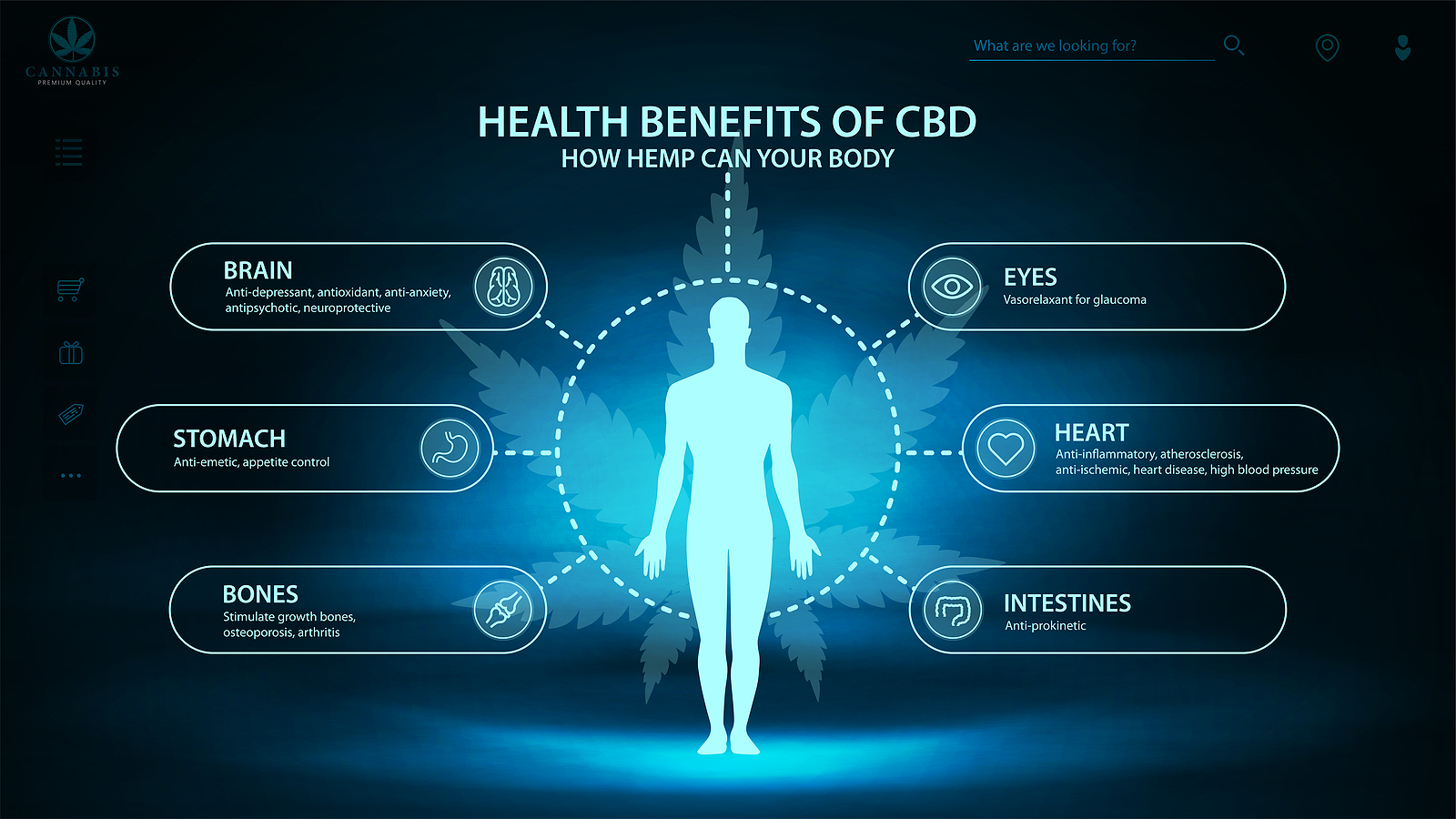POTENTIAL BENEFITS OF CANNABINOIDS
CBD Treatment in Medical Practice

Anxiolytic Properties
Generalized anxiety disorder, as well as other anxiety disorders such as OCD, social anxiety, and panic attacks, affects millions of people and has increased greatly since the start of the COVID-19 pandemic. The problem of anxiety is only growing, with prevalence at an all-time high. It is no surprise that prescription anxiolytics and anti-depressants represent a significant expenditure of the global health care dollar. Numerous studies (and the number is rapidly increasing) demonstrate a clear and significant benefit in neuropsychiatric disorders stemming from the diverse central nervous system actions of Cannabidiol (CBD). With regard to anxiety, studies show benefits in general anxiety disorder, social anxiety disorder, panic disorder, obsessive-compulsive disorder, and post-traumatic stress disorder. One such study from the University of Colorado demonstrated decreased anxiety scores within the first month of use in nearly 80% of the participants.
“My professional clinical opinion is that there absolutely is a role for Formula3 OA CBD in clinical medicine. The myriad of benefits conferred by CBD are irrefutable. Given the systemic influence of the endocannabinoid system ( as well as the effects of CBD ), I am optimistic about further studies to assess for clinical efficacy in other chronically ill patient populations.” – DR. CORY RICE, D.O.
Chronic Pain Relief
The business of pain is a multi-billion dollar a year venture. From over-the-counter remedies to prescription narcotics, we spend a great deal of time and money to help alleviate pain. In that quest, we have created a crisis for which the medical community and lawmakers are trying to find a solution. In medical publications, there is a growing acceptance that the development of medical interventions that work ubiquitously (or under most circumstances) for the majority of common chronic conditions is exceptionally difficult and all too often has proved to be fruitless. The endocannabinoid system (ECS), however, holds tremendous value and potential in almost every system of the human body. Understanding the ECS can be a critical component in managing basic and complex pain syndromes. Studies have demonstrated that CBD may help reduce chronic pain by impacting endocannabinoid receptor activity, reducing inflammation, and interacting with neurotransmitters.
Treatment for Seizures
Seizures are surges of electrical activity in the brain that occur at inappropriate times. Underlying conditions, such as epilepsy, can cause seizures. About 30% of people with epilepsy have difficulty controlling their symptoms using traditional methods. Some experts think the potential benefits of CBD may be particularly beneficial for two rare forms of epilepsy, Lennox-Gastaut syndrome, and Dravet syndrome. The syndromes typically appear in childhood, resist treatment, and cause severe symptoms, including seizures. Some doctors prescribe the FDA-approved CBD isolate Epidiolex to treat the seizures that these rare forms of epilepsy cause.
Alzheimer’s Disease
More potential benefits of CBD are in recent studies regarding Alzheimer’s Disease. CBD has been shown to reduce or remove the impact of inflammation, oxygen buildup, and brain cell decline in patients suffering from Alzheimer’s. Patients’ brain cells often show a path of rapid decline and destruction, with the inflammatory response (when the brain’s immune cells fail to clear disorienting blockages) as a core cause of Alzheimer’s symptoms. When inflammation happens in the brain, oxygen is released as a reactive, stress-induced component. The greater the inflammation, the greater the negative impact on important brain functions such as memory. CBD is an antioxidant, which helps reduce the negative impact on brain function caused by oxygen stress. In clinical trials, CBD has shown the ability to reverse and even prevent the development of Alzheimer’s negative impact. A 2011 study by Australian researchers Tim Karl and Carl Group found that CBD promotes the growth and development of brain cells, which were shown to reduce the decline of memory and other brain functions.
Insomnia
Sleep is far more important a factor in life and health span than we previously realized. The potential benefits of CBD not only decrease our inflammation and risk of metabolic disorders, but it also is the time for healing of the brain. Increasing one’s deep and REM sleep is a great strategy to reduce the risk of Alzheimer’s disease. Conversely, losing sleep can affect your critical thinking, reaction time, energy, and emotional stability. Lack of quality sleep correlates with increased mental health symptoms and pain. Improving sleep improves overall health and well-being. The long-term negative side effects of therapeutic hypnotics and decrease in effectiveness over time in this class of medications is a difficult issue for patients with chronic insomnia. The endocannabinoid system (ECS) plays a critical role in circadian components of sleep-wake cycling. By targeting the ECS, studies have demonstrated improvements in decreased sleep onset latency, decreased waking after sleep onset, and increased slow-wave sleep. Long-term studies of sleep quality assessed CBD effects using a common selfreport instrument and found a modest improvement in sleep, and more patients with improved sleep compared to poorer sleep.
